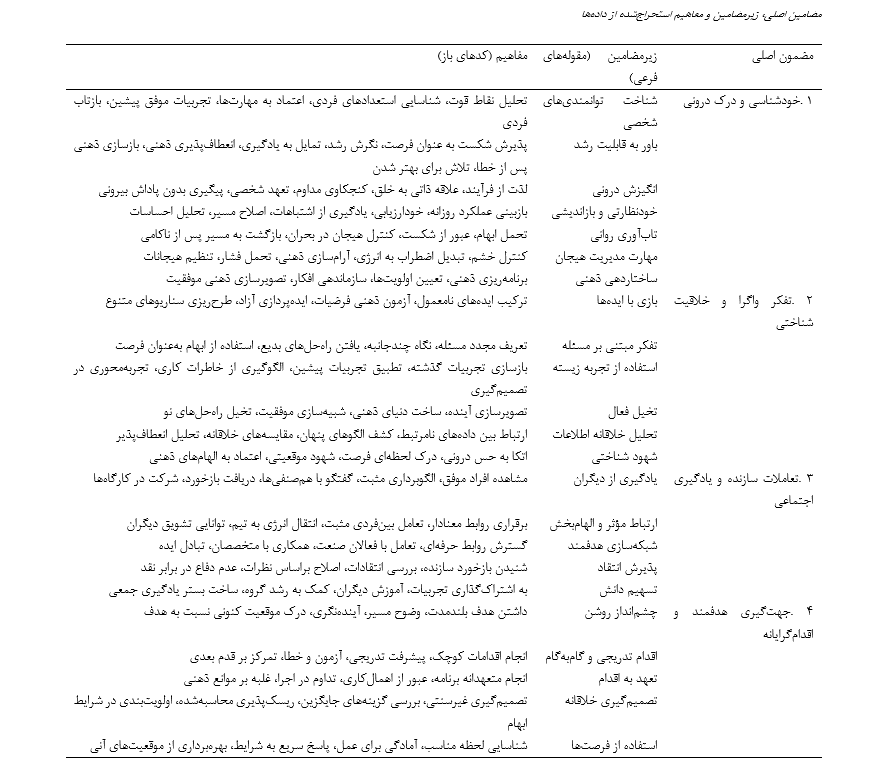Identifying Mental Patterns of Creativity in Successful Entrepreneurs: A Phenomenological Study
Keywords:
Mental patterns, creativity, entrepreneurship, qualitative research, phenomenologyAbstract
The present study aimed to identify and explain the mental patterns of creativity in successful entrepreneurs using a phenomenological approach. This qualitative study employed a phenomenological design. Participants included 24 successful entrepreneurs residing in Tehran, selected through purposive and snowball sampling. Data were collected through semi-structured interviews and continued until theoretical saturation was achieved. Thematic analysis was conducted using NVivo version 14. Peer review and participant feedback were used to ensure the credibility of the findings. Data analysis led to the identification of four main themes: "self-awareness and inner understanding," "divergent thinking and cognitive creativity," "constructive interactions and social learning," and "goal-oriented and action-based mindset." These themes encompassed 21 subthemes and over 100 open codes. Findings revealed that creativity in successful entrepreneurs is the result of a multidimensional interaction between intrinsic motivation, lived experience, social engagement, and active mental processes. The results suggest that creative mentality in successful entrepreneurs is not a fixed trait but a dynamic, purposeful, and context-dependent process shaped through interaction with the self, the environment, and others. These findings have implications for the design of educational programs and entrepreneurship development interventions.
Downloads
References
Baheel, J. K. (2021). Design Thinking and Its Creative Strategies in Industrial Design. Rimak International Journal of Humanities and Social Sciences, 03(07), 35-47. https://doi.org/10.47832/2717-8293.7-3.4
Bereznitsky, S. V. (2021). Correlation of Mentality With Cults and Life-Supporting Technologies of Indigenous Peoples of the Amur-Sakhalin Region. Study of Religion(3), 61-69. https://doi.org/10.22250/2072-8662.2021.3.61-69
Fearn, M. (2025). The Creative Attachment Interview: Using Sandtray to Reflect on Relational Dynamics in Creative Supervision. World Journal for Sand Therapy Practice®, 3(2). https://doi.org/10.58997/wjstp.v3i2.115
Ferreria, M. H. (2024). Distinguishing the Roles of Mental Imagery and Relational Reasoning in Creativity: A Review and Methodological Proposal. https://doi.org/10.31234/osf.io/wynx5
Hamzah, S. M., Katie, S., & Hammood, A. A. H. (2023). Creative Thinking Patterns and Their Relationship to the Most Important Motor Abilities and Some Offensive Handball Skills for Students. International Journal of Physiology Nutrition and Physical Education, 8(2), 01-06. https://doi.org/10.22271/journalofsport.2023.v8.i2a.2762
Jaboob, M., Awain, A. M. S. B., & Al-Ansi, A. M. (2023). Sustaining employees' creativity through the organizational justice: The mediating role of leadership styles. Social Sciences & Humanities Open, 8(1), 100693. https://doi.org/10.1016/j.ssaho.2023.100693
Kagaba, G. A. (2024). The Relationship Between Creativity and Mental Illness: An Artistic Perspective. Roje, 4(3), 34-37. https://doi.org/10.59298/roje/2024/433437
Liu, J., Spagna, A., & Bartolomeo, P. (2021). Hemispheric Asymmetries in Visual Mental Imagery. Brain Structure and Function, 227(2), 697-708. https://doi.org/10.1007/s00429-021-02277-w
Mizal, M. S., & Al-Noori, B. S. M. (2020). Development of Creative Thinking Skills in the English Language Teaching Profession. International Journal of Research in Science and Technology, 10(03), 23-37. https://doi.org/10.37648/ijrst.v10i03.004
Oktaviani, S. (2022). Meningkatkan Kreativitas Pasien ODGJ (Orang Dengan Gangguan Jiwa) Di Yayasan Satu Hati Membangun. Abdisoshum Jurnal Pengabdian Masyarakat Bidang Sosial Dan Humaniora, 1(1), 85-90. https://doi.org/10.55123/abdisoshum.v1i1.502
Pereira, A., & Aguiar, V. J. d. (2022). Sentiomics: The Identification and Analysis of Dynamical Patterns That Characterize Sentience. J. Multiscale Neurosci., 1(1), 1-10. https://doi.org/10.56280/1531632254
Salehi Nia, M., Bashghareh, V., Karimi, E., & Ahmadi, M. (2023). Investigating the role of leadership and educational management in creativity and innovation. New Research Approaches in Management Sciences(39), 45-68.
Saxena, A. K. (2021). Innovation, Creativity, Entrepreneurship Management. 313-330. https://doi.org/10.4018/978-1-7998-8327-2.ch019
Smith, A., Mangelsdorf, S. N., Baker, S., Jafari, S. J., Álvarez‐Jiménez, M., Hitchcock, C., & Cross, S. (2025). User Character Strengths Predict Engagement on a Digital Mental Health Platform for Young People (Preprint). https://doi.org/10.2196/preprints.73793
Xiaoxia, L. (2020). Creativity in the System of Professional Training of Future Specialists in Decorative and Applied Arts. Bulletin of Luhansk Taras Shevchenko National University(5 (336)), 117-125. https://doi.org/10.12958/2227-2844-2020-5(336)-117-125
Yela Aránega, A., Gonzalo Montesinos, C., & del Val Núñez, M. T. (2023). Towards an entrepreneurial leadership based on kindness in a digital age. Journal of Business Research, 159, 113747. https://doi.org/10.1016/j.jbusres.2023.113747
Yi, X., Hong, P., Chen, P., Bai, X., Li, S., Qi, S., & Runco, M. A. (2023). Creative Achievement of Eminent Scientists in Tang and Song Dynasties of China: A Historiometric Study. The Journal of Creative Behavior, 57(4), 650-660. https://doi.org/10.1002/jocb.607

Downloads
Published
Submitted
Revised
Accepted
Issue
Section
License
Copyright (c) 2025 Farshid Ghasemi Dijvejin

This work is licensed under a Creative Commons Attribution-NonCommercial 4.0 International License.










